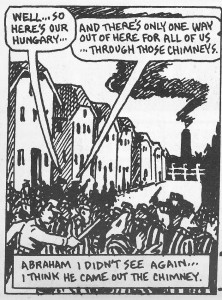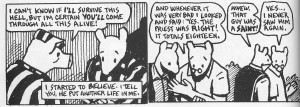One thing I really couldn’t get over in Maus II was the greater presence of dark humor than compared to volume one. Maybe it’s just me (since I know of at least one other person who didn’t find any of these things funny), but throughout chapter 1 of the graphic novel I kept finding little things that, if not about something as atrocious as the Holocaust, I might have found laugh worthy. That said, I do think that Spiegelman’s (Vladek’s narration and probably some of Art’s creation) language takes on a more fatalistic and ironic tone. I know I mentioned this on the Twitter, but here are the three examples I found early on:
This image is from page 26. What I find particularly “humorous” is Vladek’s narration at the top of the second panel. “One guy tried to exchange,” he says. Short, sweet, but an entirely ridiculous thought when you consider that this is Auschwitz, why would this “one guy” even think he could exchange anything if he had barely eaten? More to the point, why is this small anecdote included in the story? Of course anything Vladek can remember is gold for Art’s Holocaust story, but this way this memory is presented just seems to have an entirely different ring from most of Vladek’s story. Additionally, the politeness with which the “one guy” approaches the Pole is somewhat amusing. It is almost reminiscent of Oliver, “Please sir, may I have some more?”
Here I find the repetition about chimneys, and the way the dialogue becomes almost prophetic of Abraham’s unfortunate demise, to be humorous. The mirroring of Vladek’s concise and matter-of-fact narration and the fatalistic dialogue included in the scene come together to form a somewhat depressing, somewhat ridiculous and comical effect.
In this frame I see humor in Vladek’s affirmation that the Priest who gave him hope and strength was indeed a Saint. When Art says that “that guy was a saint,” I, as a reader, hope that such a saint would survive the event, but of course, to become a saint one must, quite literally, never be seen again. Also, the abruptness with which Vladek agrees lends itself to a humorous tone. And finally, the excitement with which Art expresses that this priest must have been a saint and then the jarring confrontation of the gruesome reality is so opposite that it becomes comical.
Overall, I didn’t see as much dark, fatalistic humor in the first volume as I did in the second, and was therefore forced to consider possibilities for this difference in tone. Did Vladek’s death while Art was writing the second volume phase him to the point that his tone had completely changed? I don’t know, especially since I don’t know at what point during writing the second volume that Spiegelman’s father actually died (specifically if it was before or after pages 26-28). One idea that I do have is that this dark humor is product of Spiegelman’s increasingly conflicted nature in the second volume. We see Art divided about his work, wanting to continue to tell his father’s story but not necessarily knowing how (not to mention the pressure he gets from outside to make a movie or TV show about this story that he does not want to do). Further, Art’s visits to his psychiatrist reveal more about his possible guilt in even having written the book (though, at the same time he seems to feel guilty about not being able to finish the second volume). Because a lot of the dark humor I showed earlier depends upon either a confrontation of different feelings, or the consideration of something completely ridiculous for the circumstances, in order to be funny, I think Art’s own conflicted feelings about his book and the Holocaust might be the origin of said humor. If Art can’t write a book about something he experienced himself, at least he can write his book in a way that shows he can’t completely understand the reality. He can write the book in a way that shows how ridiculous and absurd the Holocaust was.



Kristine – You’re not alone. I found a number of captions/balloons that were darkly humorous, usually because they understated the action in the panels. I really liked Art’s reaction to Pavel’s obvious fondness for cats: the caption in the last panel of page 43 “Framed photo of pet cat. Really!” and his side comment to the reader about blowing his metaphor in panel 5.